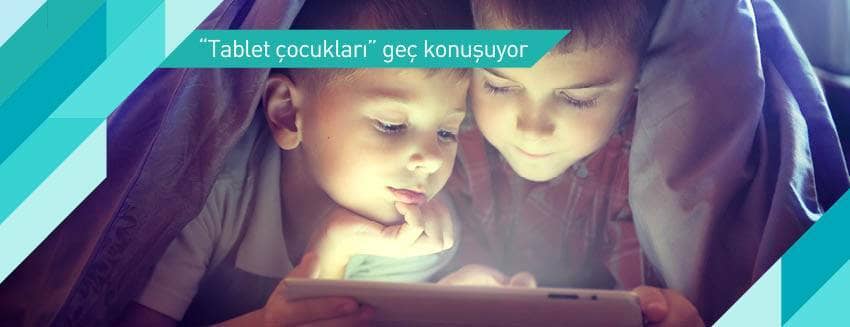
Experts point out that phones, tablets and television have very important effects on children's language development and warn about limited use. Underlining that daily use should be limited to 45 minutes, experts emphasize that children with speech problems are exposed to technology 3 times more intensively. Spending time and playing games with the child's mother and father contributes significantly to language development.
Üsküdar University NPISTANBUL Hospital Language and Speech Disorders Specialist İbrahim Yaşa said that the use of technology such as computers, tablets, cell phones and televisions causes late speech, leading to problems in language development and speech disorders.
They have communication problems
Speech and Language Disorders Specialist İbrahim Yaşa stated that they consider the use of technology in the family when evaluating children who have problems in late speech and language development and said, "Why don't these children speak, why is this very common in this period or why does this problem appear too much? When we evaluate children's speech and language skills, we ask; is there intense tablet or television or phone exposure? Does he/she engage with them intensively, how long is he/she exposed to them during the day?"
Reminding the words of psychiatrist Prof. Dr. Nevzat Tarhan, "Television is a cheap babysitter", İbrahim Yaşa warned, "Children who are called children entrusted to a cheap babysitter, who spend a lot of time with tablets and phones, are more likely to appear as individuals with communication problems."
3 times more technology use in speech problems
İbrahim Yaşa, who stated that they conducted a comparative study on the clients who applied to the NPISTANBUL Hospital Speech and Language Therapy Clinic and normally developing children, noted that children with speech problems are exposed to technology 3 times more intensively.
Stating that they conducted a study on the phone and tablet usage rates of 3-4 year old children who use tablets and phones intensively, who apply to the Speech and Language Therapy Clinic, who have speech delay or who do not speak, Yaşa said, "We conducted a survey in which we asked 30 families questions such as 'How long did you give your child a phone and tablet per day, how much time did he spend on the screen?' We also applied a questionnaire to normally developing children of the same age. When we looked at the two groups, we saw that the children of families who applied for speech delay were 3 times more likely to use phones, tablets and television than the other group."
The healthiest communication channel; speech
İbrahim Yaşa stated that families are not too concerned that excessive use of technology will be harmful, whereas communication in technology use is quite limited:
"Families ask this; 'Hocam, there is a conversation there, there is interaction with a game. Why should it affect communication development? How can the conversation I have with my friends in a dining environment affect the child? Why should the child be in this environment? Let him/her play an educational game instead. Maybe he will learn something from there.'
I tell families that communication is a system that works through a source, a receiver, a message and a channel. I am the source, the other person is the receiver. I send a message through speech and the other person gives me a feedback. This is a communication channel and a healthy communication channel. This is how it works with tablets; your child sends a message by touching the tablet, the communication channel. The tablet gives him/her a feedback, but it is not a verbal feedback. The communication becomes one-sided and affects the brain's pattern of developing healthy communication. In this context, the child may use signs instead of speech for communication, but their speech development lags behind.
Instead of saying 'mom, come', he gestures. Then, applications from families start to ask 'Why doesn't our child speak? In other words, I think there is a very significant relationship between the use of technology and language development. I think that intense exposure to tablets, phones and television is an important factor in children's lagging behind their peers in terms of their language and speech development, as well as their mental and cognitive development."
Should be limited to 45 minutes a day
Stating that families should definitely limit children's use of technology, İbrahim Yaşa gave important advice to parents:
"There may be a maximum of 45 minutes of playtime a day, or they may be spending time on TV or tablet, but if this time is prolonged, that is, if it exceeds 45 minutes, it should be suspected both in terms of the quality time spent with the child and the child's communication development. Parents should also question themselves here. Of course, this does not mean; let them grow up far away from it. Of course, technology can contribute to their development, but only to a certain extent. After a certain extent, it starts to cause serious harm.
Play games with them!
Parents should realize that they cannot raise their children only by feeding them, and they cannot develop them only by putting them to sleep at the right time. They should keep in mind that playing games with the child will support communication and language development. It is very important that they create suitable environments at home for playing games. In terms of linguistic development, if the mother and father take care of the child in the right way, they can be an important support in the child's speech development."
